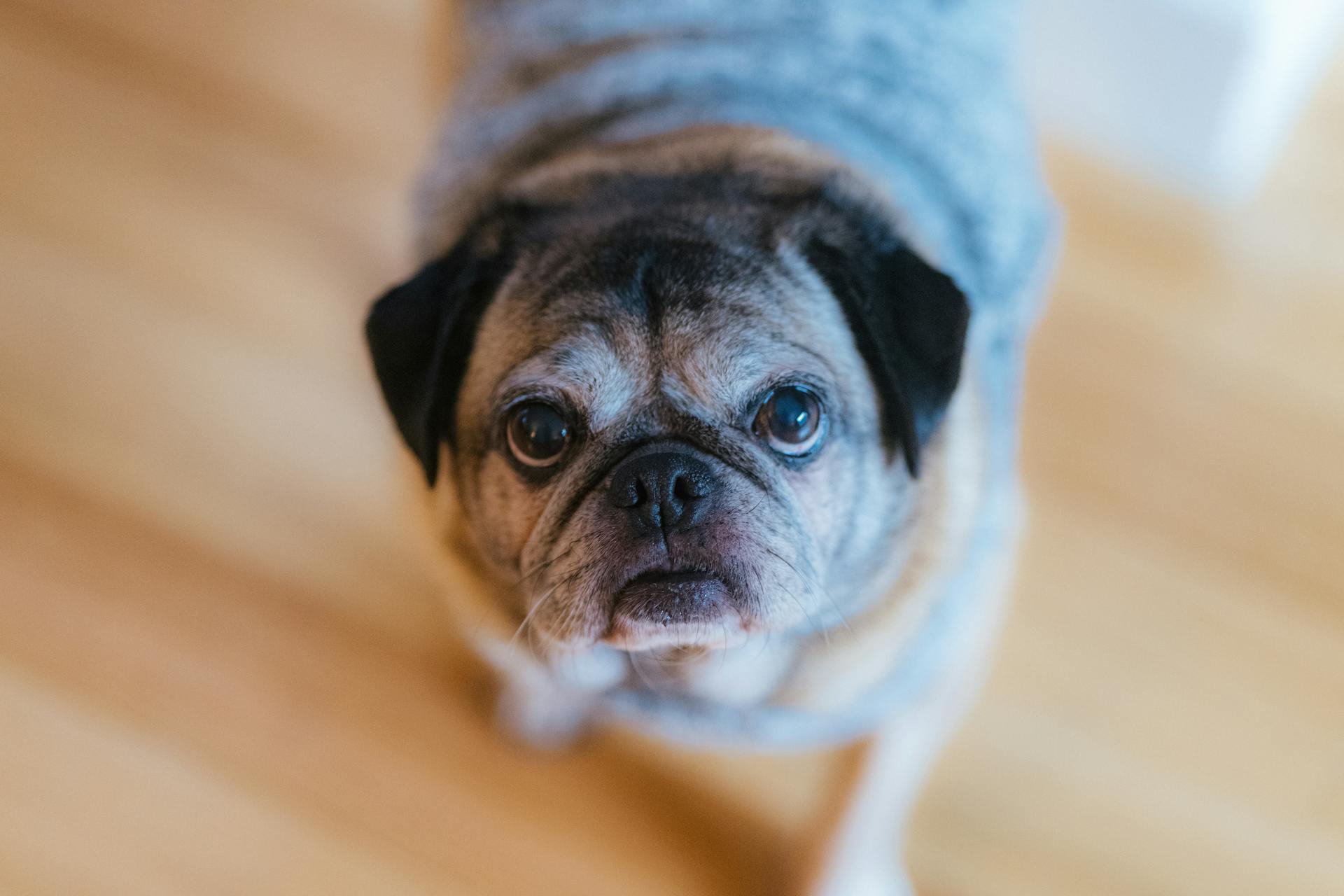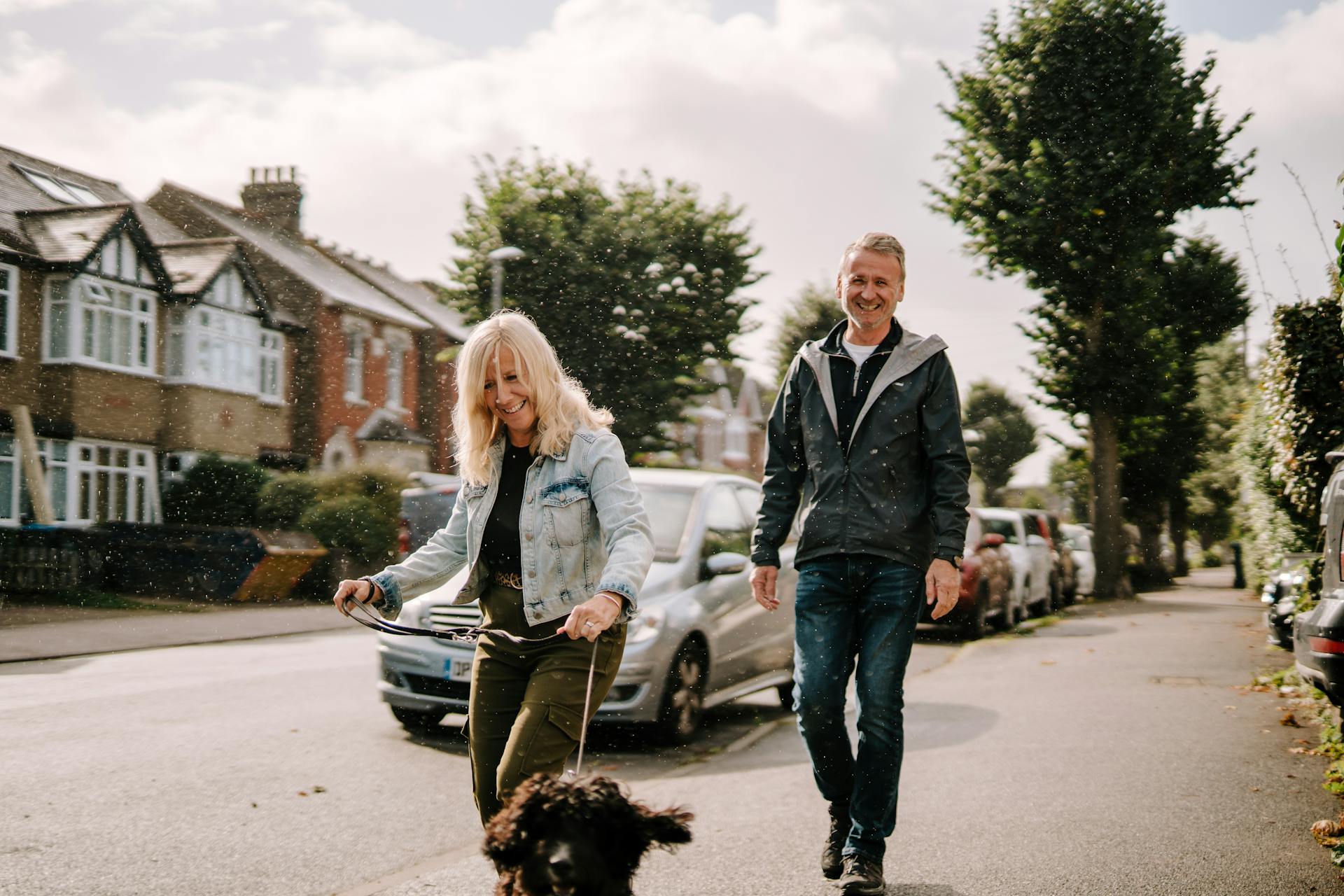
Dog dementia panting can be a distressing symptom for both dogs and their owners.
Dogs with dementia often pant due to anxiety and stress caused by the disease.
As dogs age, they may experience cognitive decline, leading to confusion and disorientation, which can trigger panting.
In the early stages of dementia, panting may be a subtle sign that owners can miss, but it's essential to recognize the behavior to provide timely support.
What Is?
Dog dementia, also known as canine cognitive dysfunction (CCD), is an age-related neurobehavioral syndrome that affects senior dogs.
It's a decline in cognitive function that can be devastating, and it's not just a normal part of aging. The odds of a dog having CCD increase 52 percent with each additional year of age.
CCD progresses gradually, often starting with only one or two obvious signs before the dog demonstrates more obvious indicators.
As a dog owner, it's essential to recognize the early signs of CCD to provide the best possible care for your furry friend.
Types of Canine Dementia
Canine dementia shows itself in different ways depending on the dog and the type of CCD.
There are several different types of dog dementia, and each one affects dogs uniquely.
Unfortunately, there is no cure for canine dementia, but research has made great progress in understanding the condition.
Medicines are now available that can help reduce some of the symptoms and slow the progression of the illness.
You should ask your vet about these medicines and how they can help your dog.
Keeping your dog fit and healthy, with plenty of games to keep their brain active, can also help.
Understanding Sundowning in Seniors
Sundowning in seniors is a common issue, and it's not just limited to humans. Dr. Leticia Fanucchi, a veterinary behaviorist, says it's a big issue that's not well understood, even among vets.
Dogs can experience sundowning, which is characterized by confusion, restlessness, and irritability after dark. If your senior dog is showing these symptoms, they may have sundowners syndrome.
A different take: Dog Dementia Sundowning
A multi-modal approach is usually required to treat sundowners in dogs, and it can involve a combination of prescription medications, natural supplements, and lifestyle changes. Selegiline is a prescription medication that can help control more severe symptoms.
Commercial and prescription senior diets, like Hill's b/d, can also demonstrate improvements in cognitive function. Natural supplements like antioxidants, gingko biloba, and Omega-3 fatty acids may help manage signs and slow the disease's progression.
Pheromone therapy and melatonin can ease anxiety and promote a feeling of wellbeing in dogs that experience increased anxiety at night. Maintaining a stimulating environment and engaging your dog in activities like brisk brushing sessions, massage therapy, and interactive toys can also help slow the progression of sundowners.
Dogs can start showing signs of cognitive decline as early as seven years of age, but it's often not noticed until they reach 10 years or older.
Consider reading: Dog Dementia Supplement
Symptoms and Behavior Changes
Symptoms of dog dementia can be subtle, but they're worth paying attention to. Your dog may become less adept at tasks they've always been good at, like house training or responding to commands.
You might notice your dog having trouble recognizing and reacting to familiar family members. Or, they might appear lost or confused in the house or yard, wandering aimlessly or staring into space.
Disorientation is a common symptom of dog dementia, and it can manifest in different ways. Your dog might go to the wrong side of the door to be let outside or get lost in familiar environments. They might also become disoriented at night, a condition known as sundowner syndrome.
Here are some common symptoms of dog dementia to look out for:
- Disorientation, including appearing lost or confused in the house or yard
- Altered Interactions with people or other pets, including not seeking attention or petting
- Sleep-wake cycle alterations, including sleeping more in the day, less at night
- House-soiling “accidents”
- Altered activity level
- Increased anxiety
- Decrease in hygiene/self-grooming
- Altered appetite
- Decreased responsiveness to stimuli
- Deficits in learning and memory
Canine Diagnosed
Diagnosing canine dementia can be a challenging process. Your veterinarian will need to rule out other potential medical issues before making a diagnosis.
Symptoms of canine dementia can be similar to those of other conditions, such as vestibular disease and degenerative myelopathy. Your veterinarian will run a number of tests, including a physical examination, routine blood tests, and ultrasounds.
A specific dog dementia assessment does not exist, so your veterinarian will rely on a process of elimination. They may also recommend more advanced imaging, such as a CT scan or MRI, to rule out other illnesses.
It's essential to take your dog to the veterinarian as soon as you notice any potential symptoms of CCD. The earlier your dog is diagnosed, the better you can manage their symptoms.
Veterinarians may not always be aware of canine dementia, but it's not a new issue. Dr. Leticia Fanucchi, a veterinary behaviorist, has been recognizing symptoms of cognitive dysfunction in dogs for over 30 years.
A unique perspective: Dogs Not Eating but Acting Normal
Behavior Changes
Behavior changes in senior dogs can be subtle, but they're often a sign of cognitive decline. Gary Landsberg, DVM, DACVB, notes that dogs may exhibit increased anxiety, decrease in hygiene/self-grooming, altered appetite, and decreased responsiveness to stimuli.
Disorientation is a common symptom, with dogs appearing lost or confused in familiar environments. This can manifest as wandering aimlessly, pacing, or staring into space.
House-soiling "accidents" are another indicator, as dogs may have trouble remembering where they've left their waste. This can be a sign of cognitive decline, but it's essential to rule out medical issues first.
Dogs with sundowners syndrome may experience increased irritability, anxiety, or agitation after dark. This can be due to a loss in the ability to communicate properly with other animals.
Traditional "DISHA" categories, developed by observing changes in behavior, include:
- Disorientation, including appearing lost or confused in the house or yard
- Altered Interactions with people or other pets
- Sleep-wake cycle alterations
- House-soiling “accidents”
- Altered activity level
These changes can be a sign of cognitive decline, but it's crucial to consult with a veterinarian to rule out other medical issues.
Treatment and Care
Dogs with dementia can benefit from a combination of management of behavior and environment, enhanced diet, and medication.
Managing the environment is crucial, so pet-proof the house just like you would for a toddler, and make it more predictable. This can help reduce anxiety and stress in dogs with dementia.
Providing daytime activities and opportunities for play can effectively manage behavior and improve quality of life for dogs with dementia. Structured social interaction is also essential for physical and mental stimulation.
Exposure to sunlight can help regulate the sleep-wake cycle in dogs with dementia, and if they can't walk anymore, using a wagon or stroller can be a great alternative.
Medication, such as selegiline (Anipryl), can improve brain function and slow the disease's progress. Anti-anxiety medications may also be prescribed if the dog experiences anxiety-related symptoms.
Dietary supplements, such as antioxidants, gingko biloba, Omega-3 fatty acids, and medium chain triglycerides, may help manage symptoms and slow the course of the disease.
Maintaining a stimulating environment and engaging in activities like brisk brushing sessions, massage therapy, and interactive toys can help stimulate brain activity and slow the progression of dementia.
Diets specifically formulated for senior dogs, such as Hill's b/d ("brain diet"), may also demonstrate improvements in cognitive function.
Intriguing read: Doberman Pinscher Von Willebrand Disease
Frequently Asked Questions
How to calm down a dog with dementia?
Establish a consistent daily routine, including regular sleep schedules, walks, and feeding times, to help reduce anxiety and confusion in dogs with dementia
Why is my senior dog panting so much?
Excessive panting in senior dogs can be a sign of underlying health issues, such as osteoarthritis, dental disease, or chronic illnesses. It's essential to consult a veterinarian to determine the cause and provide proper care for your aging pet
Sources
- https://www.thewildest.com/dog-health/canine-dementia-signs-symptoms-treatments
- https://www.thewildest.com/dog-health/sundowners-dogs-cognitive-dysfunction-syndrome
- https://www.whole-dog-journal.com/care/cognitive-dysfunction-syndrome-in-senior-dogs/
- https://www.countryliving.com/uk/wildlife/pets/a37508363/dog-dementia/
- https://dogquality.com/blogs/senior-dog-blog/6-tips-for-managing-dementia-in-senior-dogs
Featured Images: pexels.com


